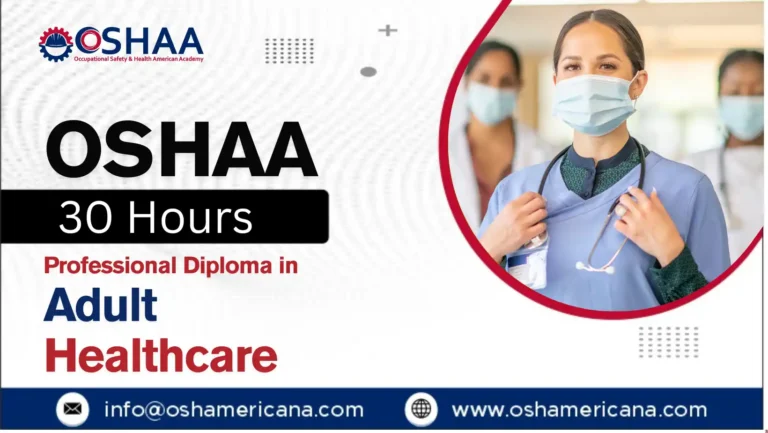The growing ageing population worldwide presents new challenges in healthcare, particularly in the area of nutrition. As individuals age, their nutritional requirements change significantly, often necessitating specialised care to support their physical and cognitive health. The OSHAA 30-Hours Professional Diploma in Geriatric Nutrition has been developed to address this vital need, offering a comprehensive understanding of nutrition tailored specifically to older adults.
This professional diploma provides an in-depth exploration of geriatric nutritional science, combining evidence-based research with practical application. It is ideally suited for healthcare professionals, dietitians, nutritionists, caregivers, and those working with the elderly in clinical or community settings. The programme also appeals to individuals seeking to broaden their knowledge in this increasingly important area of healthcare.
Delivered through a flexible learning format, the OSHAA diploma enables participants to complete the course at their own pace, making it ideal for busy professionals. The curriculum is structured to ensure that each module builds on the last, gradually equipping participants with the skills and confidence to apply their learning in real-world scenarios.
By the end of the programme, participants will have gained the ability to evaluate the nutritional needs of elderly individuals and develop tailored dietary plans that promote health, wellbeing, and independence in later life. The diploma not only enhances professional competence but also opens new opportunities for career progression in geriatric care and nutrition services.
OSHAA 30-Hours Professional Diploma in Geriatric Nutrition
Study Units
Learning Outcomes
Introduction to Geriatric Nutrition and Ageing Physiology (3 hours)
- Understand the biological and physiological changes associated with ageing
- Identify the impact of ageing on nutrient absorption and metabolism
- Recognise the importance of nutrition in promoting healthy ageing
- Gain foundational knowledge of geriatric nutrition as a specialised field
Nutritional Requirements in Older Adults (5 hours)
- Identify the specific macronutrient and micronutrient needs of older adults
- Understand how lifestyle, medical conditions, and medications influence dietary requirements
- Apply current dietary guidelines for the elderly in practical contexts
- Assess energy and hydration needs in different ageing populations
Common Nutritional Deficiencies in the Elderly (3 hours)
- Recognise the most prevalent nutritional deficiencies in ageing individuals
- Understand the causes and consequences of these deficiencies
- Explore methods for prevention and management through diet and supplementation
- Evaluate the role of routine screening and monitoring
Chronic Disease Management through Nutrition (4 hours)
- Understand the relationship between nutrition and chronic diseases such as diabetes, cardiovascular conditions, and osteoporosis
- Explore evidence-based dietary interventions to manage chronic illnesses
- Apply dietary strategies to reduce disease progression and improve quality of life
- Tailor nutritional approaches to individual health profiles
Nutrition and Cognitive Health in Ageing (6 hours)
- Examine the link between diet and cognitive function in older adults
- Understand nutritional approaches to support brain health and prevent cognitive decline
- Explore the role of antioxidants, essential fatty acids, and other nutrients in mental wellbeing
- Develop strategies to support nutrition in individuals with dementia or cognitive impairments
Nutritional Assessment Tools and Techniques (4 hours)
- Gain knowledge of various nutritional assessment tools used in elderly care
- Conduct basic anthropometric, biochemical, and dietary assessments
- Interpret assessment results to identify nutritional risk
- Understand the role of interdisciplinary collaboration in nutritional evaluations
Meal Planning and Diet Modification for Older Adults (3 hours)
- Create balanced, nutrient-dense meal plans tailored to the elderly
- Modify meals to accommodate medical conditions, chewing or swallowing difficulties, and personal preferences
- Address challenges related to appetite loss, sensory changes, and food accessibility
- Promote safe and enjoyable eating environments
Ethical and Cultural Considerations in Geriatric Nutrition (2 hours)
- Understand ethical issues related to nutritional care in ageing populations
- Respect cultural and religious dietary practices when planning nutrition interventions
- Promote autonomy and informed decision-making in nutritional choices
- Address challenges in consent, feeding support, and end-of-life care
Course Benefits – OSHAA 30-Hours Professional Diploma in Geriatric Nutrition
- Gain specialised expertise in geriatric nutrition to meet the growing demand for elderly care professionals
- Enhance your ability to assess and manage the unique nutritional needs of older adults
- Strengthen professional competence in developing evidence-based dietary strategies for age-related conditions
- Learn to implement ethical and culturally sensitive nutrition interventions in diverse care settings
- Improve practical skills in meal planning, nutritional assessment, and dietary modifications tailored to elderly individuals
- Increase career opportunities in healthcare, nutrition services, elderly care, and community health programmes
- Stay up to date with the latest research and best practices in the field of geriatric nutrition
- Earn a professional qualification that demonstrates your commitment to continuous learning and specialised care
- Build confidence in supporting the physical and cognitive health of ageing populations through targeted nutrition
- Develop transferable skills applicable across a range of healthcare and caregiving environments
The OSHAA 30-Hours Professional Diploma in Geriatric Nutrition is designed for individuals who are involved in the care, support, or nutritional management of older adults. It is particularly suitable for:
- Healthcare professionals seeking to specialise in geriatric nutrition
- Registered dietitians and nutritionists aiming to expand their expertise
- Caregivers and support workers in residential or community-based elder care
- Social care professionals responsible for elderly wellbeing
- Rehabilitation and allied health practitioners working with ageing populations
- Public health professionals focused on ageing and nutrition
- Anyone with a professional interest in promoting healthy ageing through diet and nutrition
This course is ideal for participants committed to improving the quality of life for older adults through informed, ethical, and effective nutritional practices.







